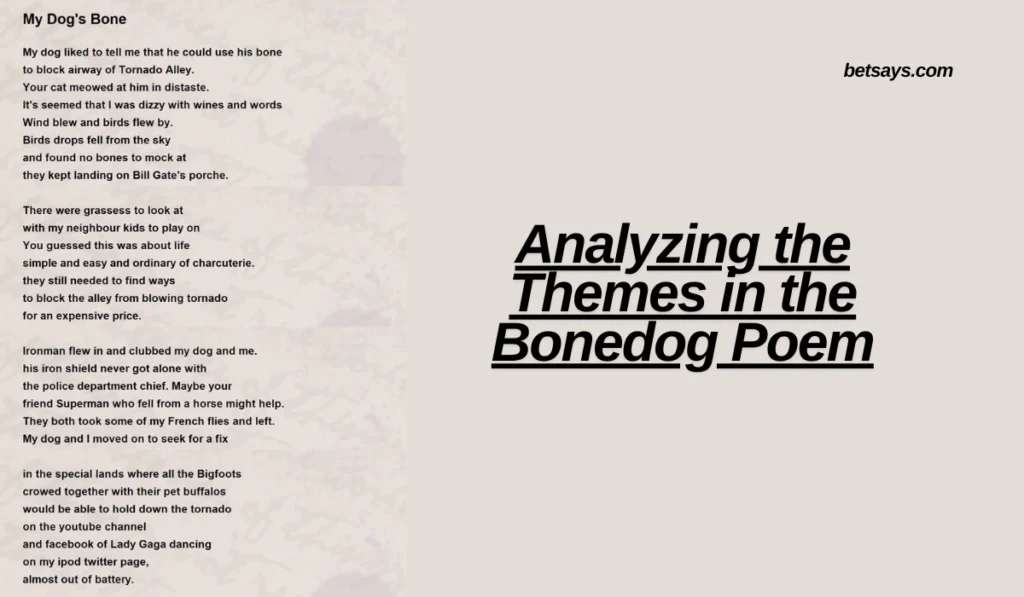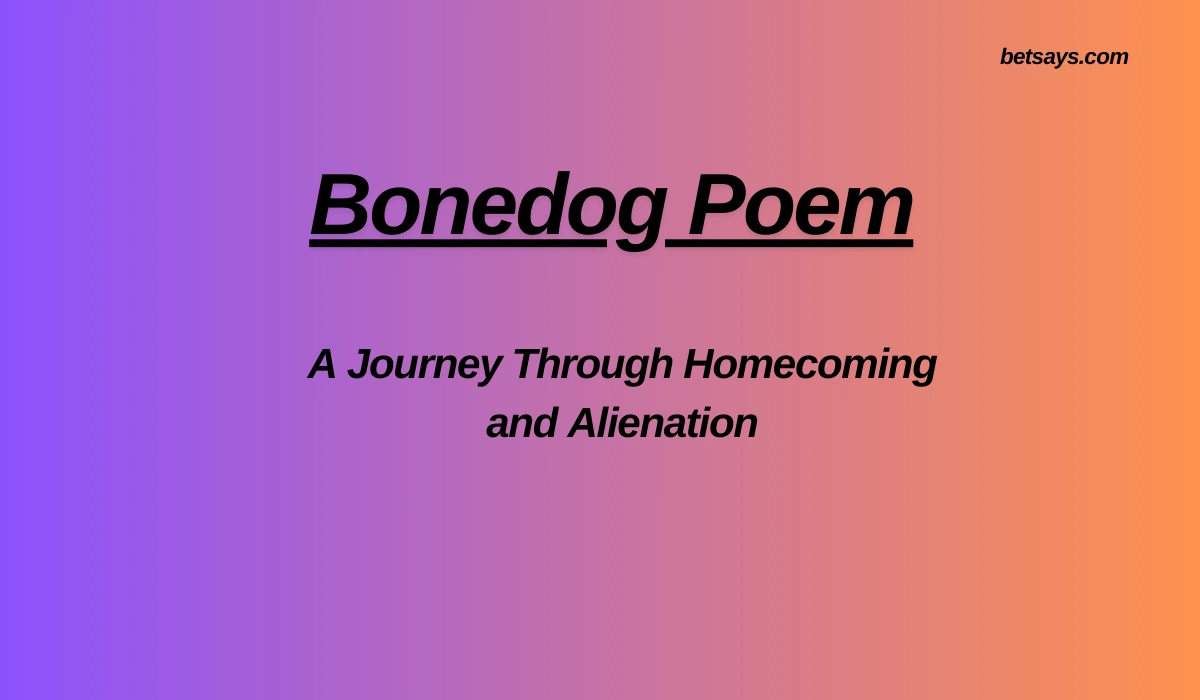Bonedog Poem: By Eva H.D.
The Bonedog Poem by Eva H.D. resonates with readers for its profound exploration of themes such as loneliness, alienation, and the harsh realities of returning home. This poem, gained wider attention when featured in the Netflix film I’m Thinking of Ending Things. Speaks to those who have experienced a sense of isolation even in familiar spaces. Through a narrative that feels intensely personal, the Bonedog opens a conversation on the feeling of disconnection from the comforts of home—often revealing the darker, less-discussed emotions that come with returning to a once-loved place.
Background and Context of the Bonedog Poem
Eva H.D., an enigmatic poet, is known for her ability to express existential themes with a raw, unfiltered voice. The Bonedog poem captivates readers by transforming the concept of homecoming into something complex. Contrasting deeply with the warm and inviting emotions traditionally associated with returning home. The poem was brought to the public eye through I’m Thinking of Ending Things, a film directed by Charlie Kaufman. Which often tackles themes of introspection and complex human emotions.
In this context, the Bonedog is a crucial element of the movie, enriching the narrative by inviting viewers to consider the shadows accompanying the protagonist’s reflections on life, relationships, and identity.
Analyzing the Themes in the Bonedog Poem

The Bonedog poem paints homecoming as something “terrible,” emphasizing the reality that a return to one’s roots is not always a joyous experience. Instead, it can lead to self-doubt, regret, and a longing for the simplicity of “anywhere but here.” This theme resonates with readers who may have struggled with feelings of loneliness despite being surrounded by familiar people and places.
The poem begins with the unsettling statement, “Coming home is terrible,” challenging the conventional view that home is synonymous with comfort. This choice of words captures the feeling of estrangement and emphasizes how individuals. Sometimes struggle to reconcile their inner changes with the static nature of their old lives. The poem uses this unsettling opening to set the stage for a reflection on why returning home might bring forth negative emotions.
The poem moves through images of tiredness, oppressive routines, and a sense of isolation, implying that the sense of belonging one feels at home may diminish over time. This portrayal of homecoming differs greatly from nostalgic depictions. I am instead suggesting that returning to one’s origins can serve as a reminder of past struggles and unresolved feelings.
Read more: Vs nails
Key Symbolic Elements in the Bonedog Poem
| Symbol | Meaning |
|---|---|
| Bone | Emptiness, past experiences, lifelessness |
| Sun | Weariness, routine, existential fatigue |
| Clouds | Ambiguity, disconnection from comfort |
| Shoelaces | Physical and emotional burdens, weariness |
Literary Devices in the Poem
Eva H.D. skillfully employs metaphors and imagery in the poem to create an eerie, almost dreamlike atmosphere. For instance, the poet uses phrases like “moon-landed, foreign,” depicting homecoming as a strange, alien experience. This imagery of being “foreign” in a place meant to be comforting adds layers to the reader’s understanding, suggesting a deeper existential discomfort.
Moreover, phrases such as “skeletal darkness” and “house of bone” echo the notion of “bonedog,” possibly symbolizing the bones of memory and past experiences that have long haunted the speaker. These metaphors allow readers to visualize the home as something hollowed out, almost as if it were stripped of life. The contrast between what the poet expected to feel and the harshness of what they experienced underscores the poem’s theme of disillusionment.
Key Quotes from the Bonedog Poem
- “Coming home is terrible.” – This line captures the essence of the Bonedog, conveying how homecoming can evoke sadness rather than comfort.
- “Whether you have a wife or just a wife-shaped loneliness waiting for you.” – This phrase reflects on relationships and loneliness. Suggesting that companionship is sometimes an illusion that fails to fill the void.
- “The sun goes up and down like a tired whore.” – A powerful metaphor that illustrates the mundane and repetitive nature of life, hinting at existential weariness.
- “Everything you see now, all of it: bone.” – This haunting line ties back to the poem’s title, suggesting a world stripped to its skeletal form, barren and lifeless.
Poetic Structure and Style of the Poem
The Bonedog poem is written in free verse, without a structured rhyme scheme or meter. Which complements its raw and conversational tone. This format allows Eva H.D. to express thoughts without the constraints of traditional structure. Which further emphasizes the sincerity and authenticity of the speaker’s voice. The free verse style reflects the fragmented, unstructured feeling of the homecoming experience described. Reinforcing the theme of discomfort and disillusionment.
Eva H.D.’s use of simple yet striking language makes the Bonedog accessible. Even to those who may not typically read poetry. The poem’s tone is intimate and direct, which resonates with readers and creates a sense of familiarity. This stylistic choice amplifies the emotional weight of the poem. Inviting readers to reflect on their own experiences of alienation and homecoming.
Psychological Impact of the Poem
One of the reasons the Bonedog poem resonates so deeply is its ability to capture the psychological impact of returning to familiar places that no longer feel like home. The poem speaks to those who feel “unmet by moonlight.” The phrase conveys a disconnection from the comforts that once brought peace.
This feeling is universal yet deeply personal, as everyone finally realizes that “home” can change. Sometimes subtly, sometimes drastically. The poem suggests that change may come not only from the physical space but from the person who returns—altered. With new experiences that may no longer fit comfortably into the old space.
Read more: Skin undertone blue vs green veins on wrist
Symbolism in the Bonedog Poem
The poem is layered with symbolism, from the imagery of bones to the portrayal of the sun and clouds. The recurring bone imagery may suggest death, decay, or even permanence, highlighting the lingering impact of past experiences. Meanwhile, the “tired whore” metaphor for the sun suggests a sense of daily exhaustion. The sun’s movements reflect the speaker’s weariness.
Through these symbols, Eva H.D. paints a picture of home as a place stripped of vitality, yet full of the remains of what once was. This bleak view of the home may resonate with readers who have experienced similar disillusionment. The poem captures the profound realization that home may not always offer the comfort it promises.
Frequently Asked Questions
What is the main theme of the Bonedog poem?
The Bonedog poem explores the themes of loneliness, alienation, and the discomfort of returning to a familiar yet changed home.
Why is the poem called “Bonedog”?
The title Bonedog may symbolize a skeletal or hollow feeling, representing the bareness of the speaker’s emotional state. It suggests a sense of emptiness and reflects the poem’s recurring imagery of bones and lifelessness.
How do I’m Thinking of Ending Things connect to the Bonedog?
In the film I’m Thinking of Ending Things, the poem underscores the protagonist’s sense of isolation and introspection.
Who wrote the Bonedog poem?
The poem was written by Eva H.D., a poet whose work often delves into existential themes and the human condition.
Conclusion
The Bonedog poem by Eva H.D. leaves a lasting impact due to its candid portrayal of the unsettling emotions associated with returning home. It uses striking imagery and metaphors to convey the weight of these feelings. Inviting readers to question the notion of home as a sanctuary. As we analyze this poem, we find a deep-seated loneliness and sense of alienation that many can relate to, especially those who have struggled with feeling disconnected from familiar places.
In I’m Thinking of Ending Things, the poem’s haunting words amplify the themes of the film. Making the Bonedog a powerful exploration of human emotion. The inevitability of change, and the enduring complexity of home. This piece of poetry serves as a mirror, reflecting the parts of ourselves that may struggle with belonging, change, and the passage of time.
By offering a raw and honest view of these emotions, the Bonedog poem continues to resonate as a part of cinematic storytelling and as a standalone work that speaks to the heart of human experience.







